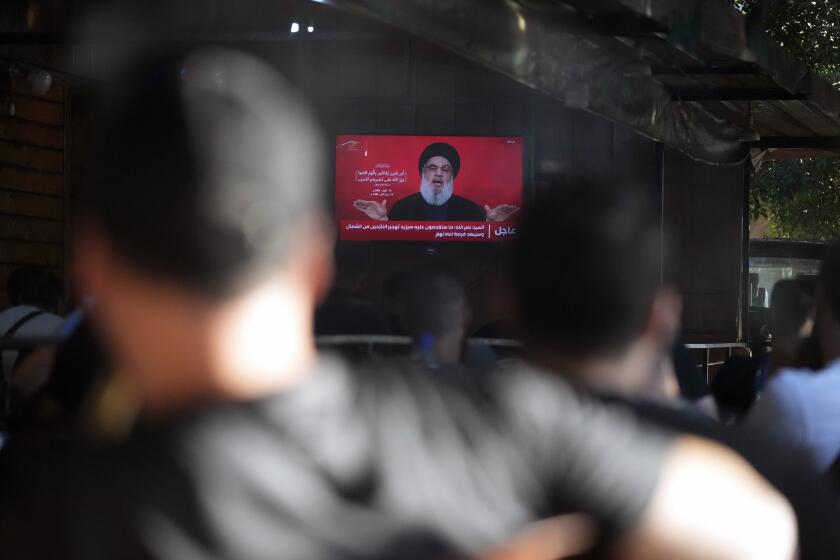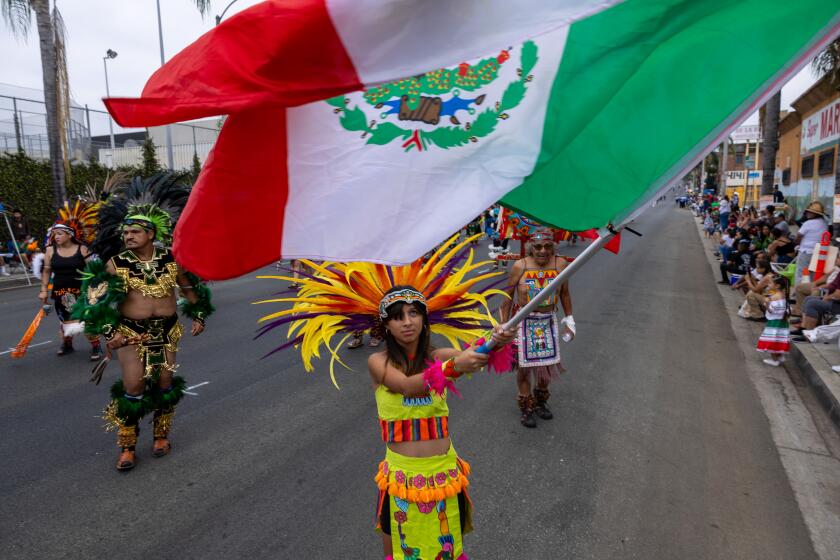Iran’s supreme leader declares: The vote stands
Iran’s supreme leader vowed Wednesday that he would neither reconsider vote results nor bow to public pressure over the disputed reelection of his ally, President Mahmoud Ahmadinejad, as state-controlled broadcast outlets intensified a media blitz against the West.
Ayatollah Ali Khamenei, Iran’s ultimate political and military authority, decried “lawlessness” after demonstrators took to the streets to dispute Ahmadinejad’s reelection in a June 12 vote that they and many independent analysts say was suspiciously out of sync with previous voting patterns and Iran’s demographics.
“Once lawlessness becomes a norm, things will be complicated and the interests of people will be undermined,” Khamenei said after a meeting with lawmakers, according to state television.
“Everyone should respect the law,” he said. “Even in the case of the recent incidents, I have been, still am and will continue to be insisting on the implementation of the law. . . . Certainly, neither the system nor the people will yield to pressure under any circumstances.”
Using batons, tear gas and large contingents of uniformed and plainclothes security forces, Iranian authorities for now appear to have beaten back their greatest domestic challenge in 30 years as a dispute over the election sharply divided both society and the political establishment into two camps: supporters of Ahmadinejad and those backing his main election challenger, Mir-Hossein Mousavi.
Pro-government Basiji militiamen have put down a series of large-scale demonstrations over the last week. On Wednesday afternoon, riot police and militiamen used clubs and tear gas near parliament at Baharestan Square to disperse protesters who numbered either several hundred or more than a thousand, according to different witnesses. Security officials fired into the air to frighten the crowd, witnesses said.
Police officers continued to guard key intersections as plainclothes militiamen on motorcycles patrolled streets. Mousavi’s wife, scholar Zahra Rahnavard, who broke with tradition in Iran’s male-dominated political society to campaign for her husband, likened the situation in the country to “martial law” on one of his websites.
Khamenei’s comments were widely viewed as an attempt to keep lawmakers in line and prevent them from defecting to the opposition camp. Many of them are pragmatic conservatives opposed to Ahmadinejad’s messianic brand of politics and critical of his handling of the economy. Parliamentary speaker Ali Larijani recently voiced criticism of the government’s response to the crisis, acknowledging in a televised appearance that many Iranians believe Ahmadinejad’s election to be fraudulent.
The Guardian Council, the country’s constitutional watchdog, said it would conclude its probe of fraud allegations by Monday.
But a crackdown on dissident journalists, activists and those close to Mousavi continued. The intelligence division of the Tehran police announced a raid on a building in the city center used as a “headquarters” for the opposition. A source said the building was Mousavi’s newspaper, where 25 journalists were arrested Monday.
“After scrutinizing the building, which was the campaign office of a presidential candidate, it was discovered that the organization of illegal gatherings, the promotion of unrest and efforts to undermine the country’s security were carried out from the building,” said a statement issued by the police, according to the website of Iran’s state-owned Press TV.
With relative quiet on the streets, state broadcasting has begun flooding airwaves with allegations that the unrest was the work of Western antagonists, especially Britain.
State television scoffed at statements President Obama made Tuesday condemning the violence against protesters but maintaining that the United States did not wish to interfere in Iranian affairs.
“The president of America once again supported the agitators inside Iran last night,” a news announcer said. “Of course, the president of America says that these remarks are not tantamount to meddling in internal Iranian affairs. But in conjunction with the Americans, the Israelis are also pursuing the objective of agitation.”
In one indication of the tension between Washington and Tehran, the White House said Wednesday that it has rescinded invitations to Iranian diplomats worldwide to attend Fourth of July celebrations in various U.S. embassies. Robert Gibbs, the White House press secretary, said no Iranian diplomat had responded to the offer, extended last month.
“Not surprisingly, based on what we see going on in Tehran, nobody’s RSVPd,” Gibbs said.
Iranian state television also aired a documentary extolling the virtues and accomplishments of the Revolutionary Guard, narrated by a man in military uniform in what some observers took as the elite military force’s consolidation of power over the traditional clergy.
Another show highlighted the dangers of the Internet, alleging that the West was using the Web to spread propaganda and sow discord.
Iran’s intelligence minister, Gholamhossein Mohseni-Ejehei, said British passport holders had been arrested in the protests. The Foreign Ministry announced that it had recalled its envoy to London
“The ministry has dismantled the groups involved in such activities and has arrested almost all group members in two stages,” the Islamic Republic News Agency quoted Mohseni-Ejehei as saying. “Anybody who embarks on espionage activity in the country will be arrested. A foreign reporter has so far been nabbed and another one has been questioned and his things were confiscated.”
Interior Minister Sadeq Mahsuli, a wealthy ally of Ahmadinejad, alleged that opposition groups abroad were fomenting the disturbances, which Western diplomats say have left as many as 100 people dead nationwide. Mahsuli accused the Paris-based Mujahedin Khalq and the ethnic Baluch militant group Jundallah, as well as “Los Angeles-based groups supported by the CIA,” of being behind the rallies.
He also issued a stern warning to Mousavi, who has called on his supporters to continue peaceful protests.
“Those who encourage people to take part in illegal rallies must be made accountable for the recent incidents and the spilled blood,” said Mahsuli, whose appointment as interior minister in November fueled suspicions that Ahmadinejad was planning to cheat in the election.
In a blow to opposition claims of large-scale voting irregularities, conservative Mohsen Rezai, who also ran against Ahmadinejad, withdrew his complaints about the vote, Press TV reported. He had said that he received half the votes he should have, or fewer.
The current “political, social and security situation has entered a sensitive and decisive phase, which is more important than the election,” Rezai said in a letter to the Guardian Council, headed by Ayatollah Ahmad Jannati, a close ally of Khamenei and Ahmadinejad.
--
Mostaghim is a special correspondent. Times staff writer Paul Richter in Washington contributed to this report.
More to Read
Sign up for Essential California
The most important California stories and recommendations in your inbox every morning.
You may occasionally receive promotional content from the Los Angeles Times.










